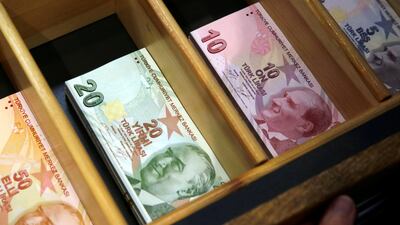The most vulnerable corners of emerging markets are bracing for turbulence as Turkey’s stand-off with investors begins to test the nerves of traders.
Currencies from South Africa’s rand to Brazil’s real are witnessing a spike in their expected volatility, signaling concern they may weaken the most along with the lira over the next month. The price-swings have evoked memories of last year when a meltdown in the Turkish exchange rate spurred panic selling across emerging markets.
Volatility in the lira has posted the biggest four-day surge since 2004 as officials adopt measures to create a scarcity of the currency to prevent a slump in its value. As overnight borrowing rates crossed 1,000 per cent, traders have dumped the nation’s stocks and bonds days before an election that will test the popularity of President Recep Tayyip Erdogan.
“It looks like there is some contagion, mostly focused on the high beta currencies -- the South African rand and the Brazilian real," Brendan McKenna, a strategist at Wells Fargo Securities in New York, said. "That’s not that uncommon. Those currencies felt some pain after the lira crisis last year too.”
Still, the reaction from elsewhere in global emerging markets has been muted. The MSCI EM Currency Index is down less than 1 per cent since the turmoil erupted last week. Further losses will depend on what actions are taken by Turkish authorities.
The surge in FX swap points seems related to idiosyncratic factors in Turkey rather than a broader squeeze in dollar funding costs. Investors are probably concerned that there could be some contagion to other EM currencies given the experience last year, Jason Daw, Singapore-based head of emerging-markets strategy at Societe Generale, said.
"High beta EM is most at risk from a deterioration in sentiment", but for Asia it is important to realise that the direct trade and financial linkages are very small," Mr Daw noted.
Emerging markets "tend to move as a bloc, so quid pro quo, we should see EM tarred with the same brush here in Asia, Jeffrey Halley, a senior market analyst at Oanda Corporation in Singapore, said.
Turkey, he said, is perhaps a symptom and not a cause. The main driver being off course, a potential global slowdown. Investors are already nervous about world economy and the trade talks in Beijing will hang like a cloud over Asia markets, he noted.
Marcin Lipka, a senior analyst at Cinkciarzpl in Poland, however, said that there is “no contagion effect, at least so far".
"As the overall sentiment to emerging markets is neutral or somewhat positive. The local election in Turkey is troublesome. [Mr] Erdogan’s AKP is losing support in the largest cities and the authorities are overly optimistic regarding the economy.”

